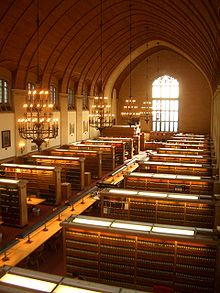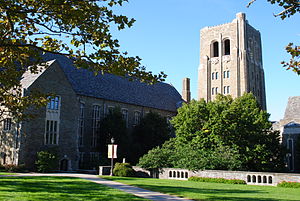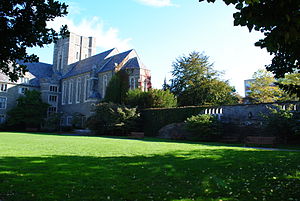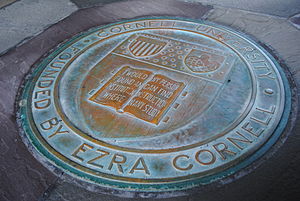- Cornell Law School
-
Cornell Law School 
Established 1887 School type Private Parent endowment $5.28 billion Dean Stewart J. Schwab Location Ithaca, New York, US Enrollment 591[1] Faculty 88[1] USNWR ranking 13[2] Bar pass rate 90.9%[1] Annual tuition $51,150[3] Website www.lawschool.cornell.edu ABA profile Cornell Law School Profile Cornell Law School, located in Ithaca, New York, is a graduate school of Cornell University and one of the five Ivy League law schools. The school confers three law degrees. The school has a student to faculty ratio of 10.4 to 1, the third lowest of the 184 American Bar Association-accredited law schools in the United States.[4]
Contents
History
The Law Department at Cornell opened in 1887 in Morrill Hall with Judge Douglas Boardman as its first Dean. At that time, admission did not require even a high school diploma. In 1917, two years of undergraduate education was required for admission, and in 1924, it became a graduate degree program.[5] The department was renamed the Cornell Law School in 1925. In 1890, George Washington Fields graduated, one of the first law-school-graduates of color in the United States.[6] In 1893, Cornell had its first female graduate, Mary Kennedy Brown.
In 1892, the school moved into Boardman Hall, which was constructed specifically for legal instruction. The school moved from Boardman Hall (now the site of Olin Library) to its present-day location at Myron Taylor Hall in 1937. The law school building, an ornate, Gothic structure, was the result of a donation by Myron Charles Taylor, a former CEO of US Steel, and a member of the Cornell class of 1894. An addition to Myron Taylor Hall, the Jane M.G. Foster wing, was completed in 1988. Foster was a member of the class of 1918, and was the first woman to serve as Editor-in-Chief on an American law review.
In 1948, Cornell Law School established a program of specialization in international affairs and also started awarding LL.B. degrees. In 1968, the school began to publish the Cornell International Law Journal. In 1991, the school established the Berger International Legal Studies Program. In 1994, the school established a partnership with the University of Paris I law faculty to establish a Paris-based Summer Institute of International and Comparative Law. In 2006, the school established its second summer law institute in Suzhou, China. The Clarke Program in East Asian Law and Culture was established in 2002.
Campus
Cornell Law is housed within Myron Taylor Hall (erected 1932), which contains the Law Library, classrooms, offices, a mock court room, Hughes Dining facility, dormitory space for students of the Law School, and the Cornell Legal Aid Clinic.
Library
The law library contains 700,000 books and microforms and includes rare historical texts relevant to the legal history of the United States.[7] The library is one of the 12 national depositories for print records of briefs filed with the United States Supreme Court. Also, there is a large collection of print copies of the records and briefs of the New York Court of Appeals. The large microfilm collection has sets of Congressional, Supreme Court, and United Nations documents, as well as a large collection of World Law Reform commission materials. Microfiche records and briefs for the United States Supreme Court, the United States Court of Appeals for the Second Circuit and D.C. circuit, and the New York State Court of Appeals are also collected.[8] The library also has a large collection of international, foreign, and comparative law, with the main focus being on the Commonwealth of Nations and Europe. Along with this, there are also collections of public international law and international trade law. A new initiative by the library is to collect Chinese, Japanese, and Korean resources to support the Law School’s Clarke Program in East Asian Law and Culture.[8]
Rare books in the library include the Samuel Thorne collection, which has 175 of the some of the earliest and most rare books on law. Other significant collections include the Nathaniel C. Moak library and the Edwin J. Marshall Collection of early works on equity and the Earl J. Bennett Collection of Statutory Material, a print collection of original colonial, territorial, and state session laws and statutory codes.[8] Among the library’s special collections are 19th Century Trials Collection, Donovan Nuremberg Trials Collection, Scottsboro Collection, William P. and Adele Langston Rogers Collection and the Chile Declassification Project.[8]
Admissions
For the Fall 2010 entering class, Cornell Law School received 6,269 applications for 205 spots. The median undergraduate GPA for the 2010 entering class was 3.70, while the median LSAT score was 168. The admission rate for the Fall 2010 entering class was 18%.[9]
In the LL.M. program, which is geared to non-U.S.-trained lawyers, 900 applications were received for the 50 to 60 openings. LL.M. students come from over 30 different countries.[10]
Along with consideration of the quality of an applicant's academic record and LSAT scores, the full-file-review admissions process places a heavy emphasis on an applicant's personal statement, letters of recommendation, community/extracurricular involvement, and work experience. The application also invites a statement on diversity and a short note on why an applicant particularly wants to attend Cornell. The Law School values applicants who have done their research and have particular interests or goals that would be served by attending the school versus one of its peer institutions.[10]
Reputation
Rankings include 7th in the 2009–10 Law School 100 rankings,[11] 28th in the world by the QS World University Rankings by Subject: Law,[12] 13th in the 2009 U.S. News and World Report,[13] and its master of laws, or LL.M., program ranked 1st in the 2011, 2010, 2008 and 2006 AUAP rankings.[14] In 2011, the National Law Journal reported that Cornell Law graduates had the 2nd highest percent placement at the top 250 law firms.[15]
Academics
Degree programs offered by Cornell Law:
- Juris Doctor (JD)
- Master of Laws (LL.M.)
- Doctor of Juridical Science (J.S.D.)
- Joint program with Samuel Curtis Johnson Graduate School of Management (JD/MBA)
- Joint program with Cornell School of Industrial & Labor Relations (JD/MILR)
- Joint program with Cornell Institute for Public Affairs (JD/MPA)
- Joint program with Cornell College of Architecture, Art, and Planning (JD/MRP)
- Joint program in international and comparative law (JD/LL.M.)
- Joint programs in various fields (JD/MA/PhD)
The advanced degrees in law, LL.M. and JSD, have been offered at Cornell since 1928.[16] The JD/MBA has three- and four-year tracks, the JD/MILR program is four years, the JD/MPA is four years, and JD/MRP is four years.
In addition, Cornell has joint program arrangements with universities abroad to prepare students for international licensure:
- Joint program with University of Paris (La Sorbonne) (JD/Master en Droit)
- Joint program with Humboldt University of Berlin (JD/M.LL.P)
- Joint program with Institut d’Études Politiques de Paris (JD/Master in Global Business Law)
The JD/Master en Droit lasts four-years and prepares graduates for admission to the bar in the United States and in France. The JD/M.LL.P is three years and conveys a mastery of German and European law and practices. The JD/Master in Global Business Law lasts three years.
Cornell Law School runs two summer institutes overseas, providing Cornell Law students with unique opportunities to engage in rigorous international legal studies. The Cornell-Université de Paris I Summer Institute of International and Comparative Law at the Sorbonne in Paris, France offers a diverse curriculum in the historic Sorbonne and Centre Panthéon (Faculté de droit) buildings at the heart of the University of Paris I: Panthéon-Sorbonne. Coursework includes international human rights, comparative legal systems, and international commercial arbitration. French language classes are also offered.
In 2006, Cornell Law School announced that it would launch a second summer law institute, the new Workshop in International Business Transactions with Chinese Characteristics in Suzhou, China. In partnership with Bucerius Law School (Germany) and Kenneth Wang School of Law at Soochow University (China), Cornell Law provides students from the United States, Europe, and China with an academic forum in which they can collaborate on an international business problem.
Initiatives
Legal Information Institute
Cornell Law also is home to the Legal Information Institute (LII), an online provider of public legal information.[17] Started in 1992, it was the first law site developed for the internet.[18] The LII offers all opinions of the United States Supreme Court handed down since 1990, together with over 600 earlier decisions selected for their historic importance.[19] The LII also publishes over a decade of opinions of the New York Court of Appeals, the full United States Code, the UCC, and the Code of Federal Regulations among other resources.[17]
It recently created Wex, a free wiki legal dictionary and encyclopedia, collaboratively created by legal experts.[20] And the LII Supreme Court Bulletin is a free email- and web-based publication that intends to serve subscribers with thorough, yet understandable, legal analysis of upcoming Court cases as well as timely email notification of Court decisions.[21]
Publications
The school has three law journals that are student-edited: the Cornell Law Review, the Cornell International Law Journal, and the Cornell Journal of Law and Public Policy. Additionally, the Journal of Empirical Legal Studies is a peer-reviewed journal that is published by Cornell Law faculty.
Moot Court
Cornell Law students actively participate in myriad moot court competitions annually, both in the law school itself and in external and international competitions. The Langfan First-Year Moot Court Competition, which takes place every spring, traditionally draws a large majority of the first-year class. Other internal competitions include the Cuccia Cup and the Winter Cup.
People
Faculty
See also: List of Cornell University facultyCornell Law faculty include Robert S. Summers, co-author of the authoritative treatise on the Uniform Commercial Code; Michael C. Dorf, legal blogger; and William A. Jacobson, political blogger.
Alumni
See also: List of Cornell University alumniCornell Law has more than 9,000 alumni worldwide. Edmund Muskie J.D. '39 served as Governor of Maine, as a U.S. Senator, and as U.S. Secretary of State under Jimmy Carter. Samuel Pierce J.D. '49 served as U.S. Secretary of Housing and Urban Development under Ronald Reagan. William P. Rogers J.D. '37 served as U.S. Attorney General and as U.S. Secretary of State under Richard Nixon. Philip H. Hoff J.D. '51 served as Governor of Vermont.
Alumni in business include Xerox Chairman Sol Linowitz, U.S. Steel CEO Myron Charles Taylor, and Major League Baseball President Bob DuPuy J.D. '73. Other prominent alumni include football coach Pop Warner, Rutgers University president Edward J. Bloustein, and International Criminal Court president Song Sang-Hyun J.S.D.
See also
References
- ^ a b c Cornell Law School Official ABA Data[dead link]
- ^ "Law - Best Graduate Schools - Education - US News and World Report". Grad-schools.usnews.rankingsandreviews.com. http://grad-schools.usnews.rankingsandreviews.com/grad/law. Retrieved 2011-08-18.
- ^ "Tuition and Expenses". Lawschool.cornell.edu. 2010-07-08. http://www.lawschool.cornell.edu/admissions/tuition/tuition_expenses.cfm. Retrieved 2011-08-18.
- ^ ABA – LSAC Official Guide to Law Schools.
- ^ "Cornell Law School: History". Lawschool.cornell.edu. 2010-07-08. http://www.lawschool.cornell.edu/about/history.cfm. Retrieved 2011-08-18.
- ^ "Cornell Law School: Historical Timeline". Lawschool.cornell.edu. 2010-07-08. http://www.lawschool.cornell.edu/about/timeline/. Retrieved 2011-08-18.
- ^ "Tax Proof Blog: Rankings of Law Libraries". Tax Proof Blog. http://taxprof.typepad.com/taxprof_blog/2005/12/arl_law_library.html. Retrieved 2006-06-23.
- ^ a b c d "Cornell Law School Library". Cornell University. http://www.lawschool.cornell.edu/library/INFORMATION/About_the_Library/collections.htm. Retrieved 2006-06-23.
- ^ "Admission and Preparation". Lawschool.cornell.edu. http://www.lawschool.cornell.edu/admissions/FAQ/admission_and_preparation.cfm. Retrieved 2011-08-18.
- ^ a b "Cornell Law School". JDAadmission.com. http://www.law-school-admission.com/cornell/#students. Retrieved 2006-06-23.
- ^ "Law School 100 Rankings". http://www.lawschool100.com/. Retrieved 2010-11-22.
- ^ http://www.topuniversities.com/university-rankings/world-university-rankings/2011/subject-rankings/social-sciences/law
- ^ "Best Law School Rankings | Law Program Rankings | US News". Grad-schools.usnews.rankingsandreviews.com. http://grad-schools.usnews.rankingsandreviews.com/best-graduate-schools/top-law-schools/rankings. Retrieved 2011-08-18.
- ^ "AUAP Rankings". http://www.auap.com/llm.html. Retrieved 2009-12-28.
- ^ "Top 250 firms hire most from big names". The National Law Journal. http://www.law.com/jsp/nlj/PubArticleNLJ.jsp?id=1202483173162. Retrieved 2011-06-18.
- ^ "Robert S. Stevens, Cornell Law School (1919-1954)". http://heinonline.org/HOL/Page?handle=hein.journals/clqv54&div=33&g_sent=1&collection=journals#348. Retrieved 2010-03-03.
- ^ a b "Legal Information Institute". Law.cornell.edu. http://www.law.cornell.edu/. Retrieved 2011-08-18.
- ^ Laurence, Helen; William Miller (2000). Academic research on the Internet: options for scholars and libraries. Routledge. p. 160. ISBN 0789011778. http://books.google.com/books?id=U3DTGfZkHywC&lpg=PA160&dq=%22legal%20information%20institute%22%20%22cornell%22&lr=&pg=PA160#v=onepage&q=%22legal%20information%20institute%22%20%22cornell%22&f=false.
- ^ Hall, Kermit; John J. Patrick (2006). The pursuit of justice: Supreme Court decisions that shaped America. Oxford University Press US. p. 244. ISBN 0195325680. http://books.google.com/books?id=4upmi30oV8cC&lpg=PA247&dq=%22legal%20information%20institute%22%20and%20%22cornell%22&lr=&as_drrb_is=b&as_minm_is=0&as_miny_is=2005&as_maxm_is=0&as_maxy_is=2010&num=100&as_brr=0&pg=PA247#v=onepage&q=%22legal%20information%20institute%22%20and%20%22cornell%22&f=false.
- ^ "Wex Legal Dictionary and Encyclopedia". Topics.law.cornell.edu. http://topics.law.cornell.edu/wex/. Retrieved 2011-08-18.
- ^ "LII Supreme Court Bulletin". Topics.law.cornell.edu. http://topics.law.cornell.edu/supct/cert/. Retrieved 2011-08-18.
External links
Ivy League law schools Columbia Law School • Cornell Law School • Harvard Law School • University of Pennsylvania Law School • Yale Law School
Law schools of the mid-Atlantic states Delaware Maryland New Jersey New York Albany Law School (Union Univ.) • Benjamin N. Cardozo School of Law (Yeshiva Univ.) • Brooklyn Law School • University at Buffalo Law School (SUNY) • City University of New York School of Law • Columbia University School of Law • Cornell Law School • Fordham University School of Law • Hofstra University School of Law • Jacob D. Fuchsberg Law Center (Touro College) • New York Law School • New York University School of Law • Pace University School of Law • St. John's University School of Law • Syracuse University College of LawPennsylvania Beasley School of Law (Temple Univ.) • Earle Mack School of Law (Drexel Univ.) • Duquesne University School of Law • Dickinson School of Law (Penn State) • University of Pennsylvania Law School • University of Pittsburgh School of Law • Villanova University School of Law • Widener University School of Law (Harrisburg)Virginia Appalachian School of Law • George Mason University School of Law • The Judge Advocate General's Legal Center and School • Liberty University School of Law • Regent University School of Law • University of Richmond School of Law • University of Virginia School of Law • Washington and Lee University School of Law • William & Mary School of LawWashington, D.C. West Virginia Coordinates: 42°26′38″N 76°29′09″W / 42.443874°N 76.485803°W
Categories:- Cornell University
- Colleges and schools of Cornell University
- Law schools in New York
- Educational institutions established in 1887
Wikimedia Foundation. 2010.






